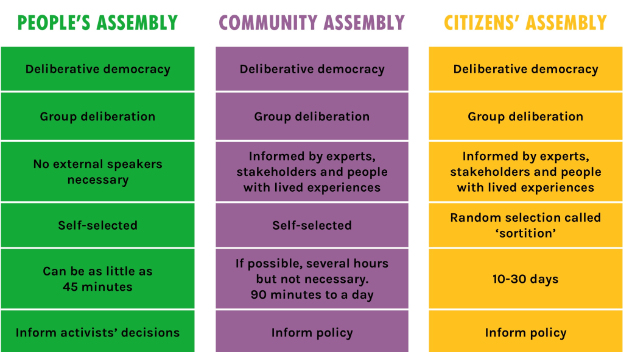What Are Assemblies?
Deliberative democracy is rooted in good information and shared understanding in order to make informed decisions.
Assemblies, a form of deliberative democracy, allow people to have informed, open conversations, express opinions and share ideas in an inclusive, structured way. The recommendations or key ideas can either be shared with other groups, or lead to further assemblies, diving deeper into subjects.
It is important that the assembly process and what will happen to the results are communicated clearly. Keeping to the structure, as closely as possible, is best for everyone to have confidence in the outcomes.
Assemblies may be more or less formal. They can vary in length, complexity and cost, according to whether the decision affects a few people taking part in a small activity, or the population of an entire country. The three types below are just a few examples of how assemblies can work.

-
People's Assemblies - On-the-hoof, ‘casual’, particpants are self-selecting, for quick decision making or gathering of ideas, e.g. during actions.
-
Community Assemblies - These involve more planning and last longer - anything from a few to several hours. Although participants are self-selected, they should be advertised widely to maximise inclusion and encourage diversity of attendance. Plans should be in place to process outputs that can inform policy and decisions. The partipants should be aware of the impacts they can make by giving their time to this process. This type of assembly is to be used for XRUK's Movement Assemblies.
-
Citizens' Assemblies - The most formal type, they are informed by experts, participants are chosen via 'sortition' (like a jury) to be representative of the population, usually run over a number of days and should inform policy. Participants may be paid for their time, so relatively expensive. They are embedded in XR's third demand.
